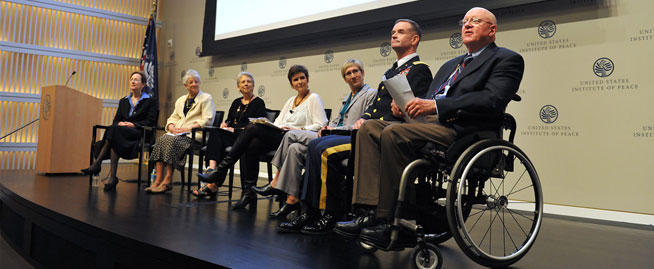On May 18th, USIP hosted a public event on "Trauma Resilience as a Keystone to Building the Rule of Law in Conflict-Affected Societies," examining the phenomenon of trauma from the panelists' experiences in post-conflict zones and the ways in which it affects initiatives to promote justice, security, and the rule of law, with a focus on Libya as a case study.

"We understand that there are wounds we can’t see. We also understand that all of us have post-traumatic stress," Colonel (Promotable) Walter E. Piatt said at the May 18th multi-panel briefing on trauma resilience at the United States Institute of Peace (USIP).
The discussion served to highlight the affect of trauma on people in post-conflict communities and how trauma adversely affects the building of rule of law. The first panel brought together experts on trauma who spoke of their personal experiences in conflict zones. In the case of each of these experts, it was their personal experiences with trauma that spurred them to develop innovative tools and techniques to address trauma. Dr. Beatrice Pouligny, a professor at Georgetown University and practitioner in the field, remarked, "Trauma can transform a society’s collective identity."
The second panel addressed this transformation by examining Libya as a case study on how trauma currently affects the Libyan people following the recent revolution. For a country still coming to grips with change, the notion of building the rule of law can be a monumental task, particularly when the lingering trauma of the Gaddafi regime and the revolution have not been addressed. The panel included Wail Nagem, the Libyan Deputy Minister of Justice, and Essam Gheriani, a psychologist from Libya, both of whom participated in the revolution. "We need a state where the Libyan people can achieve their life objectives," said Gheriani.
During the course of USIP's recent work in Libya, both high-level Libyan officials and the community identified trauma as a major issue affecting and hindering the establishment of rule of law. Only by empowering post-conflict communities and practitioners in the field with the knowledge to diffuse the legacy of trauma will we be able to break the cycle of violence and build a better path to justice and security.
View a recording of the event: Panel One & Panel Two
Read in more detail about the event at the Event Page.